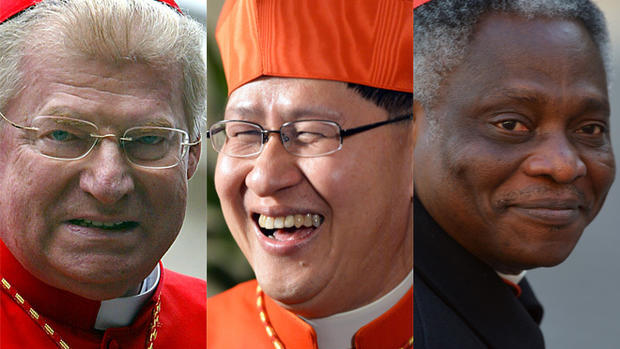Catholic Cardinals hear plea for "unity" as they prepare to elect a new pope
Updated at 6:53 a.m. Eastern
VATICAN CITY The cardinals tasked with electing the Roman Catholic Church's new pope began Tuesday morning with a Mass in St. Peter's Basilica at the Vatican. Following the service, the 115 cardinal electors returned to their hotel-like quarters for lunch before they were due to shut themselves into the Sistine Chapel for the first day of the actual papal conclave -- the ritualistic voting process which will see them chose the next pontiff.
Torrential downpours in St. Peter's Square kept the number of faithful and curious low as inside the Basilica, Cardinal Angelo Sodano, dean of the College of Cardinals, asked his fellow prelates "to cooperate with the Successor of Peter, the visible foundation of such an ecclesial unity."
Sodano's appeal for unity comes on the heels of the first resignation of a pope in almost 600 years, and just hours ahead of the process which will serve to install a new Catholic leader on whose shoulders will rest the daunting task of steering the Church out of an era marked by scandal and allegations of infighting and mismanagement.
Pope Benedict XVI's resignation exacerbated the problems the Church has been attempting to deal with quietly for more than a year, sparking speculation that corruption and poor management practices brought vividly to light by the publication of private documents from the pontiff's own desk might even have catalyzed his decision to step down.
In his wake, the now-Pope Emeritus Benedict left a Church divided, by many accounts, between the Vatican's inner-circle of prelates who dominate its bureaucracy, known as the Curia, and many cardinals from outside that circle who feel, perhaps more keenly, pressure from their congregations and the world at large to drag the 2,000 year old institution into the 21st century.
- Complete coverage: Change at the Vatican
- Speaking to a new generation of priests
- Watch: Vatican press secretary says frontrunners "scared"
Cardinals from the Americas, Asia and Africa have indicated that change must come, throwing around words like "transparency" and "openness" which may make some of their colleagues in the Church who cherish its long-entrenched tradition of secrecy uncomfortable.
When the 115 cardinal electors -- by Church rules all cardinals under the age of 80 who are physically able to attend -- enter the Sistine Chapel later Tuesday, they will have already discussed for days the qualities the new pontiff should possess, and whom among them they believe is best suited to the task.
Indications are that the cardinals struggled to agree on whether the priority should be finding a new pope with the oratory gifts and persona to swell the estimated 1.2 billion headcount of Catholics around the world right now, or with the temperament and managerial skills to get the Church bureaucracy and finances in order. There is not thought to be one man who possesses all of those qualities in unison, leaving the field of potential pontiffs, or "papabili," wide open.
CBS News correspondent Mark Phillips reports that, oddly, an Italian -- Cardinal Angelo Scola -- is the champion of the reformist camp supported by many non-Italian cardinals, those who seem to want to reform the way the Church runs itself. Conversely, a Brazilian -- Odilo Scherer -- is a traditionalist and supported by the largely-Italian faction which would prefer to leave the Curia to go about its business more or less as usual.
Neither man, reports Phillips, is thought to have enough votes to break through to the required two-thirds majority in the early balloting, and there are a lot of people who could slip through the middle as votes shift. It's happened before.
"This time around, there are many different candidates, so it's normal that it's going to take longer than the last time," Chile's Cardinal Francisco Javier Errazuriz told The Associated Press, adding an oft-repeated claim that, "there are no groups, no compromises, no alliances, just each one with his conscience voting for the person he thinks is best, which is why I don't think it will be over quickly."
For any man to be elected, he must garner the support of 77 of the 115 cardinals voting. On Tuesday, the cardinals may chose to hold their first round of voting, or they may decide to put that off until the second day of the conclave on Wednesday.
The cardinals are expected to enter the Sistine Chapel and close the doors, sealing themselves off from all outside influence and contact, at about 11:30 a.m. Eastern, and CBSNews.com will provide live video as they enter the ornate chapel in solemn procession.
Beginning Wednesday morning, the cardinals will hold two rounds of voting, with two ballots each, every day until a single candidate reaches the 77-vote threshold. Two votes will be held in the morning and if they are inconclusive, another two will be held in the afternoon. All voting ballots will be burned in small ovens in the chapel after each round of voting, producing the smoke which, when black, indicates no pope has been elected and when white, indicates a new pontiff has been chosen.
